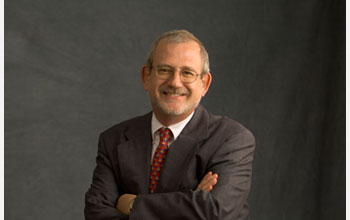News Release 09-142
NSF Selects University of Michigan Historian to Head Social, Behavioral and Economic Sciences

Myron Gutmann will head NSF's Social, Behavioral and Economics Directorate.
July 24, 2009
This material is available primarily for archival purposes. Telephone numbers or other contact information may be out of date; please see current contact information at media contacts.
The National Science Foundation (NSF) has selected University of Michigan historian Myron Gutmann, director of the Inter-University Consortium for Political and Social Research, to head its directorate for Social, Behavioral and Economic Sciences (SBE). The directorate supports research that builds fundamental knowledge of human behavior, interaction, social and economic systems, and organizations and institutions.
Gutmann, who specializes in historical demography and population-environment relationships with a focus on Europe and the Americas, begins his position on Nov. 2, 2009.
"The work NSF does to build knowledge of human systems and how we interact with society will be rewarded by the presence of such a fine scholar and leader as Dr. Gutmann," said NSF Director Arden L. Bement, Jr. "We're pleased and excited that he is able to join us."
NSF is an independent federal agency that supports fundamental research and education across all fields of science and engineering, with an annual budget of $5.92 billion. NSF funds reach all 50 states through grants to more than 1,700 universities and institutions. Each year, NSF receives about 42,000 competitive requests for funding, and makes more than 10,000 new funding awards.
"This is a critical moment for SBE research in the United States," said Gutmann. "I see my role as enabling the strengthening of SBE science, facilitating new inter-disciplinary and international collaboration, and building the technological infrastructure needed to understand our society in the 21st century."
As Gutmann prepares to assume his new responsibilities at NSF, Judy Sunley, deputy assistant director for SBE will head the directorate as the acting assistant director.
Three office areas make up SBE: the Division of Behavioral and Cognitive Sciences; the Division of Social and Economic Sciences; and the Division of Science Resources Statistics (SRS), the nation's primary source of data on the science and engineering enterprise.
"Dr. Gutmann is taking on an important role in furthering the study of human society," said University of Michigan Provost Teresa Sullivan. "His scholarly credentials and leadership experience make him especially well-suited for this position. The University of Michigan has long been a leader in social science research and is proud to have a member of its faculty serving the field in this way."
Gutmann has a broad range of interests in interdisciplinary historical population studies, especially relating population to agricultural, the environment, and health. He also studies ways that digital materials can be properly preserved and shared, and how the confidentiality of research subjects can be protected when data about them is made available for secondary use. He is an expert on historical demography and the social, demographic and economic history of Europe and the Americas.
His current research focuses on the relationship between population and environment in the Great Plains of the U.S., and on the history of the U.S. Hispanic population.
-NSF-
Media Contacts
Bobbie Mixon, NSF, (703) 292-8485, email: bmixon@nsf.gov
Diane Swanbrow, University of Michigan, (734) 647-4416, email: swanbrow@umich.edu
The U.S. National Science Foundation propels the nation forward by advancing fundamental research in all fields of science and engineering. NSF supports research and people by providing facilities, instruments and funding to support their ingenuity and sustain the U.S. as a global leader in research and innovation. With a fiscal year 2023 budget of $9.5 billion, NSF funds reach all 50 states through grants to nearly 2,000 colleges, universities and institutions. Each year, NSF receives more than 40,000 competitive proposals and makes about 11,000 new awards. Those awards include support for cooperative research with industry, Arctic and Antarctic research and operations, and U.S. participation in international scientific efforts.
Connect with us online
NSF website: nsf.gov
NSF News: nsf.gov/news
For News Media: nsf.gov/news/newsroom
Statistics: nsf.gov/statistics/
Awards database: nsf.gov/awardsearch/
Follow us on social
Twitter: twitter.com/NSF
Facebook: facebook.com/US.NSF
Instagram: instagram.com/nsfgov


